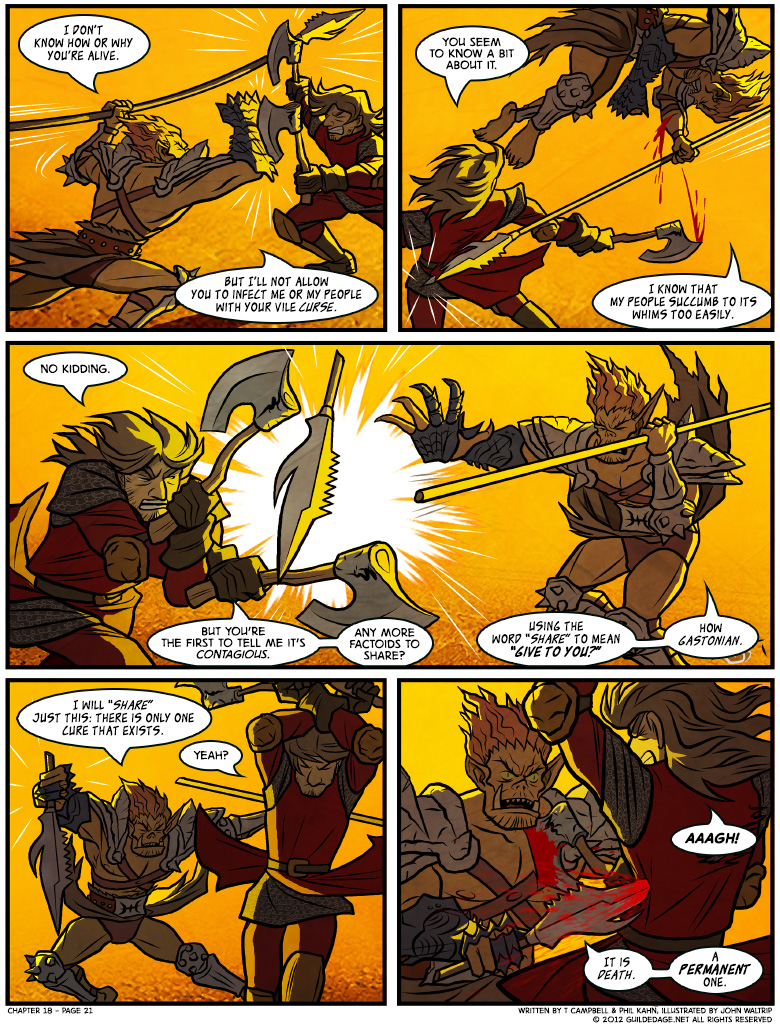Annotated 18-21
 Harky’s “share” quip here was my addition to Phil’s script; he liked it enough to put in a script note about it, which felt good. I kind of have to hold on to good collaborative moments like that as I review these pages, because the end of this chapter was not an easy time for us, as I’ll get into over the next few installments.
Harky’s “share” quip here was my addition to Phil’s script; he liked it enough to put in a script note about it, which felt good. I kind of have to hold on to good collaborative moments like that as I review these pages, because the end of this chapter was not an easy time for us, as I’ll get into over the next few installments.
“Factoids” sure feels like more of an Earth word than an Arkerra word, but I suppose Frigg doesn’t have to be the only one who picks up a few pieces of argot from their comatose counterpart.
Man, that alt text ended up aging poorly, didn’t it?











Had the nature of the curse been decided at this point in the narrative? I ask because it occurs to me that for all Harky’s talk about how his people are so easily infected by the curse, we never see an infected troll.
… Bump
Yeah, it had been. We just never got around to that, though we did spend a lot of time with a troll who’d been specifically immunized against madness.
Akshully, Harky, knowledge is shared, not given away. You don’t forget things just because you tell them to someone else.
I don’t know why the alt text wouldn’t have aged well, but I’m only vaguely familiar with GoT*. I’m not even sure which line the alt text is a response to.
*(Winters are long, little brat has the punchable-est face, Sean Bean dies (but I repeat myself), super cool short dude, hot dragon chick, lots of people die, paper cup. That’s about the extent of my GoT knowledge.)
After thinking about it, a few folks in the series actually came back from the dead. And that’s not even counting the frost zombies.
That’s probably why the alt text hasn’t aged well.
Well, in Game of Thrones (the books) various people came back from the dead: Cat Stark and both of the Targaryen infants, to name 3.
The gastonian sharing line seems a little unfair to me in hindsight, actually. I mean, it’s not like he’s gonna lose the knowledge, is he?
I would feel it’s appropriate for Byron to also misuse words as is a popular trend, not just among the internet savvy.
Interesting note about the word “factoid” though, it doesn’t mean “an interesting little fact.” It actually originally means a myth that is so widespread, it is accepted as fact. So like that “You swallow X amount of spiders every night” factoid… or the word ‘factoid’ meaning ‘trivial fact’ also being a factoid.
The Oxford English Dictionary lists both definitions, although it does show that yours is the older by about a decade.
The -oid suffix in general means “resembling” or “like”. So a factoid is something that seems like a fact, but isn’t, necessarily.
I had to explain that to my priest, who constantly used “factoid” to mean “small fact” in sermons. Also Star Trek bits. Also Downton Abbey updates. Interesting times…
Frankly, I think this is a battle against lexical change that’s already been lost. I may not like it when the kids today use “alright” or put no space after an ellipsis, but I can’t pretend that’s not the done thing now without turning into that stereotypical old English teacher who asks her students, “I don’t know, CAN you go to the bathroom?” and waits for them to say “…MAY I?”
Lexical change born out of a need to adapt to changing circumstances and ideas is a good thing and should be encouraged.
Lexical change born out of ignorance and/or deliberate mis-education leads to newspeak.
“Can vs May” is a good example. “Can” refers to ability, “May” refers to permission. I know several people who were allowed to be sloppy with that as children and never taught the distinction. When talking to them it quickly becomes apparent that in many cases they literally (the correct meaning, not the modern, ignorant one) believe that an authority figure forbidding something makes it impossible for other people to do.
Sloppy writing/speaking is indicative of sloppy thinking. Sloppy thinking leads to poor decisions.
Okay, I’ve been trying to figure this out but I have NO IDEA what’s going on with your gravatar, so I’m just gonna delete these later today unless it’s something you can fix from your end.